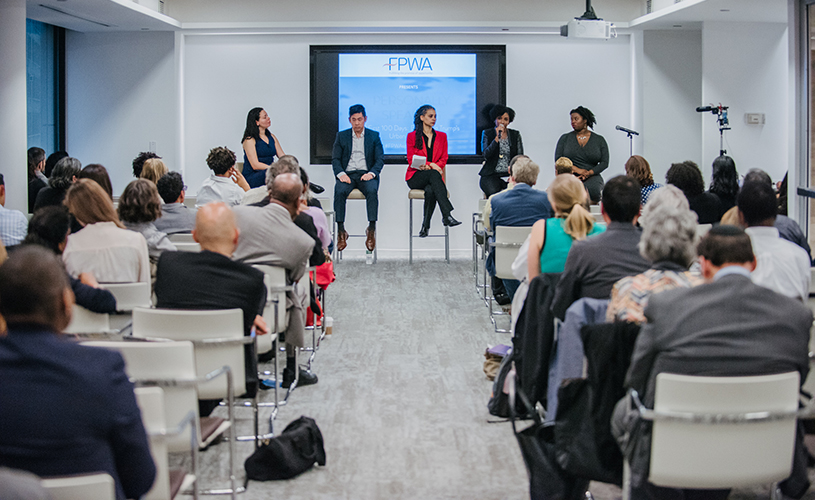
Panelists talk about the first months of the Trump administrations during a panel at FPWA’s offices. (Josh Scott/FPWA)
How are New York nonprofits and progressives feeling after the first few months of President Donald Trump’s tenure? Scared but empowered, according to a May 11 panel hosted by the Federation of Protestant Welfare Agencies.
The tension between both emotions was central to the conversation, which examined the first 100 days of the Trump administration.
Not surprisingly, the panelists expressed concerns about steps taken to repeal the Affordable Care Act, proposed budget cuts that could trim programs for the poor and efforts to stiffen sentencing guidelines for nonviolent drug offenders.
Maya Wiley, who chairs the city’s Civilian Complaint Review Board and is senior vice president for social justice at The New School, referred to the administration’s intentions as “intentional ignorance in service of the elite.”
Other members of the panel – Zerlina Maxwell, the director of progressive programming for Sirius XM, and Shirley Leyro, a criminal justice professor at Borough of Manhattan Community College – were united in branding the administration a danger to progressive goals.
The discussion also included the future of the Democratic Party, the role citizens play holding government accountable and the targeting of immigrants. But the conversation also praised the work of activists who stood up to the administration.
Here are three of the top takeaways:
RELATED: New York's MWBEs need the states help
Politicians aren’t rock stars
L. Joy Williams, a national political strategist, said it was important to reverse the relationship between officials and engaged citizens, and said people must be proactive in holding legislators at all levels accountable for establishing better funding structures and policies. “The elected official doesn’t have to be the rock star,” she said.
More specifically, she said, it isn’t just about exercising the right to vote, but how that right can affect people’s lives. For example, those who marched and died to agitate for the Voting Rights Act during the civil rights movement did so under threat from the Ku Klux Klan and often local law enforcement.
“They had no elected power, they had no power to protect themselves, their property, their communities and their children,” Williams said. “What they saw in the right to vote was the ability to elect themselves and protect themselves and assert their citizenship in the country.” That connection between involvement and voting, Williams said, has a direct effect on the ability of people to succeed and leads to a more informed electorate.
The census counts
Wiley said one issue that hasn’t garnered as much attention as it should is ensuring an accurate census count. The U.S. Census Bureau is gearing up for its decennial count in 2020. Proposed funding under Trump’s proposed “skinny budget” is far less than the agency requested, and the department’s director, John Thompson, recently announced his plans to resign in June. The census helps determine how much funding flows to communities, as well as how to apportion U.S. House and state legislative districts. “It is the dollars, but it is also representational power,” Wiley said.
RELATED: Preventing nonprofit properties from falling to private capital
The tally will be conducted online for the first time, but low-income people are less likely to have access to the internet, according to the Pew Research Center. Community centers with internet access and traditional collection methods such as paper forms will still be used. “We have a system that is rigged for an undercount,” Wiley said, citing the low internet use among poor communities.
“By a mixture of sheer incompetence and just simply malignance, we’ve started to actually show just how destructive this agenda is.” – Steven Choi, executive director of the New York Immigration Coalition
Turning despair into hope
Steven Choi, executive director of the New York Immigration Coalition, recalled the January weekend after Trump signed the travel ban executive order that left many travelers detained at airports, including John F. Kennedy International Airport. Representatives of NYIC, along with other groups and unaffiliated lawyers and protesters, descended on Kennedy Airport. “By the time I made my way to JFK, it was a sight I’d never seen in my life,” Choi said.
“Thousands of people, the energy in the air, people chanting, I mean it was an incredible, incredible moment,” he said. Thousands attended a rally in Battery Park the following day. “There are so many people who have come out of the woodwork and we’ve started to win,” he said, citing the court rulings that suspended the administration’s bans. “And now, I think that it’s by a mixture of sheer incompetence and just simply malignance, we’ve started to actually show just how destructive this agenda is.”
He cited Trump’s proposed border wall expansion, the reduction of refugees allowed to come to the United States, and plans to expand the number of U.S. Immigrations and Customs Enforcement officers as steps against a humane immigration policy.
Choi said the environment reminded him of 2004, when George W. Bush was re-elected president, followed by a year in which the U.S. House of Representatives passed a bill that would have criminalized helping undocumented immigrants. But that darkness led to major pro-immigration protests in spring 2006.
“In the midst of the doom and the gloom,” Choi said, “there is an opportunity.”


